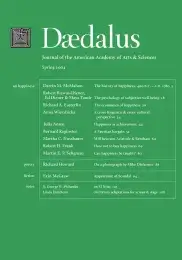Can happiness be taught?
Since World War II, the field of psychology has largely focused on suffering. Psychologists now measure such formerly fuzzy concepts as depression, schizophrenia, and anger with respectable precision. We have discovered a fair amount about how these disorders develop across life, about their genetics, their neurochemistry, and their psychological underpinnings. Best of all, we can relieve some of the disorders. By my last count fourteen of the several dozen major mental illnesses could be effectively treated–and two of them cured–with medications or specific psychotherapies.1
Unfortunately, for many years interest in relieving the states that make life miserable has overshadowed efforts to enhance the states that make life worth living. This disciplinary bias has not preempted the public’s concern with what is best in life, however. Most people want more positive emotion in their lives. Most people want to build their strengths, not just to minimize their weaknesses. Most people want lives imbued with meaning.
What I have called Positive Psychology concerns the scientific study of the three different happy lives that correspond to these three desires: the Pleasant Life, the Good Life, and the Meaningful Life. The Pleasant Life is about positive emotions. The Good Life is about positive traits– foremost among them the strengths and the virtues, but also the talents, such as intelligence and athleticism. The Meaningful Life is about positive institutions, such as democracy, strong families, and free inquiry. Positive institutions support the virtues, which in turn support the positive emotions.2 In its scope, then, Positive Psychology diverges markedly from the traditional subject matter of psychology: mental disorders, developmental stunting, troubled lives, violence, criminality, prejudice, trauma, anger, depression, and therapy.
But can a science of Positive Psychology lead us to happiness? Five years ago, in an effort to answer that question, I . . .
